In the interest of full disclosure, here are the books we received in March.
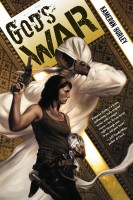 God's War Kameron Hurley Night Shade Books | 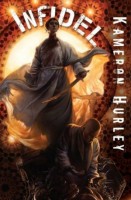 Infidel Kameron Hurley Night Shade Books |  The Chronicles of Silverwolf: The Dawning of a Hero Eric Fox |
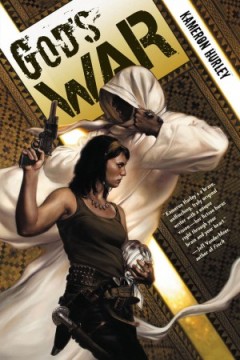
In the interest of full disclosure, here are the books we received in March.
 God's War Kameron Hurley Night Shade Books |  Infidel Kameron Hurley Night Shade Books |  The Chronicles of Silverwolf: The Dawning of a Hero Eric Fox |
Help Promote Prometheus Unbound by Sharing this Post
in Articles, Featured Posts, Film, Novels, Science Fiction, Statism


Whatever good you have heard about The Hunger Games, the reality is more spectacular. Not only is this the literary phenom of our time, but the movie that created near pandemonium for a week from its opening is a lasting contribution to art and to the understanding of our world. It’s more real than we know.
In the story, a totalitarian and centralized state — it seems to be some kind of unelected autocracy — keeps a tight grip on its colonies to prevent a repeat of the rebellion that occurred some 75 years ago. They do this through the forced imposition of material deprivation, by unrelenting propaganda about the evil of disobedience to the interests of the nation-state and with “Hunger Games” as annual entertainment.
In this national drama and sport, and as a continuing penance for past sedition, the central state randomly selects two teens from each of the 12 districts and puts them into a fight-to-the-death match in the woods, one watched like a reality show by every resident. The districts are supposed to cheer for their representatives and hope that one of their selected teens will be the one person who prevails.
So amidst dazzling pageantry, media glitz and public hysteria, these 24 kids — who would otherwise be living normal lives — are sent to kill each other without mercy in a bloody zero-sum game. They are first transported to the opulent capitol city and wined, dined, and trained. Then the games begin.
At the very outset, many are killed on the spot in the struggle to grab weapons from a stockpile. From there, coalitions form among the groups, however temporary they may be. Everyone knows there can only be one winner in the end, but alliances — formed on the basis of class, race, personality, etc. — can provide a temporary level of protection.
Watching all this take place is harrowing to say the least, but the public in the movie does watch as a type of reality television. This is the ultimate dog-eat-dog setting, in which life is “solitary, poor, nasty, brutish, and short,” in the words of Thomas Hobbes. But it is also part of a game the kids are forced to play. This is not a state of nature. In real life, they wouldn’t have the need to kill or be killed. They wouldn’t see each other as enemies. They wouldn’t form into evolving factions for self-protection.
Help Promote Prometheus Unbound by Sharing this Post
in Audiobooks, Featured Posts, Novels, Reviews, Science Fiction
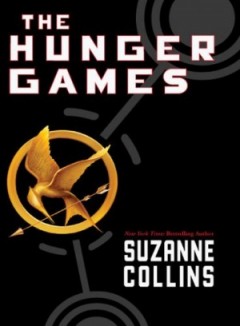
I started the 11-hour Audible.com audiobook of The Hunger Games, by all-time bestselling Kindle author Suzanne Collins, in the evening. Eight hours later, I finally summoned one small spark of the courage of its heroine, 16-year-old black-market hunter-gatherer Katniss Everdeen, and touched a half-frozen, bloody, mud-encrusted finger to my iPhone’s STOP button even though three hours remained. As soon as I awoke a few hours later, I checked the condition of my burns and cuts and was surprised to find that they had healed. No, that wasn’t it; those things had only happened to characters in a book.
The Hunger Games film-release buzz intrigued me enough to dive into the book before visiting the theater. I had previously only heard superficial mentions of a dark, brutal story and did not become interested until some of the advance film reviews suggested that the story might actually convey significant and thoughtful content in an action package. It does.
This is a fresh addition to the list of classic dystopian dramatic critiques of the state that work by showing what the state does to society and human beings in a magnified, allegorical form. The author’s choice of a close first-person voice and sympathetic main character transform the central state’s artificial battle game show into a very human landscape in the context of a post-apocalyptic North America. The nature of zero-sum game-making is revealed through a specific set of living eyes.
The Hunger Games are staged annually as an ongoing punishment for a failed rebellion against the center decades earlier. The center wants the 12 peripheral districts, each also kept isolated from the others, to always remember their subservient status and the futility of resistance. Twenty-four “tributes” between the ages of 12 and 18, one male and one female from each of the districts are selected by a lottery called “the reaping” and travel by luxury express train to the glorious and wealthy “Capitol” to compete in a gladiatorial survival reality TV marathon that the entire nation watches like the Olympics.
Instead of winning on points or being voted off, contestants are to live off the land and kill each other any way they can in a struggle to be the last one alive as days of combat, evasion, and nature survival stretch out before the cameras. Only one can live, winning a year of bonus rations for their home district and personal survival, a generous lifetime income, and celebrity status. Those selected are trained, groomed, costumed, and interviewed before the games. Viewer betting is intense, and sponsors can, at great expense, send players they favor well-timed small gift aid items by precision micro-parachute drop during the games. This makes it helpful for players to make a good impression on potential sponsors before the games even begin, incentivizing them to participate in staged pre-game pageantry.
Katniss has been a part-time hunter and gatherer from early childhood. In a starving coal district, she became the sole provider for her unstable mother and younger sister after her father’s death in a mine explosion. She supports her family by recalling her father’s lessons and becoming an illegal hunter in the forest outside the dilapidated District-12 security fence. Officials avoid arresting or shooting her or Gale, her hunting partner, because the officials themselves enjoy buying wild game, vegetables, berries, and herbal products from them.
Help Promote Prometheus Unbound by Sharing this Post
in Articles, Film, IP, Novels, Science Fiction


So you want to see Hunger Games when it comes out on Thursday at midnight? It’s not likely that you will get the chance. Tickets in my community have been sold out for weeks. In fact, the first 10 showings of the film are sold out. This disappoints me greatly because it is one of the few teen flicks I’ve really wanted to see.
The whole phenomenon seems set to make the Harry Potter hysteria and the Twilight mania seem like warm-up acts. Ask around among teens, and you will hear this confirmed. This is a true example of mass frenzy. Actually, the whole thing seems like a modern “madness of crowds.” It’s “pandemonium,” as People magazine put it.
Both the plot line and the marketing genius have lessons for our time.
Based on a book by Suzanne Collins that came out in 2008, the film tells the story of an impoverished, totalitarian society in which rebellion among the subjects is punished by the creation of a killing game for mass entertainment. A teenage girl is put in the position to kill or be killed, but she cleverly plots to stand up to the regime by cooperating with her opponent. Together, they win the hearts of the crowd and bring the regime to its knees.
In other words, it is a story about personal freedom against a powerful state, a tale of courage and defiance in the face of power. The reviews by actual readers (versus professional critics) are over the top. It’s Amazon’s No. 1, and it has 4,000 reviews and counting. This is a phenom.
Aside from the plot line, there is something contemporary about the theme of sheer deprivation and survival. It sums up the way young people are looking at the opportunities they are being presented in these times. We aren’t playing hunger games yet, but when an entire generation is pretty sure that it will not fare as well as its parents’ generation, that’s not good. Life seems like the zero-sum game posited in the film.
Help Promote Prometheus Unbound by Sharing this Post
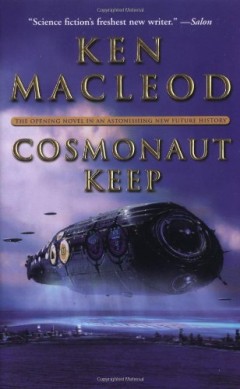
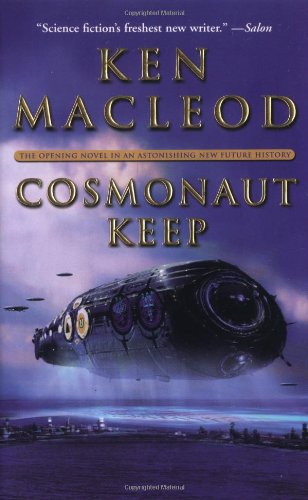
Cosmonaut Keep is the first book of the Engines of Light trilogy by Ken MacLeod, combining space opera with a unique take on the ufo mythos and a variety of leftist and libertarian political perspectives. It is told in two widely different alternating timelines, both focusing on the dream of interstellar travel.
The first timeline is set in a near-future Edinburgh, in a world where a neo–Soviet Russia has beaten back the United States and installed a kinder, gentler socialism in Europe. Matt Cairns is a computer programmer, and a member of the International Workers of the World Wide Web (or Webblies). He stumbles upon a group of American libertarians trying to overthrow the Party for fun and profit, and ends up carrying a mysterious data disk containing what appear to be plans for light-speed travel and an antigravity spaceship. Meanwhile, a rebellious European space station claims to have made first contact with aliens within an asteroid.
The second timeline is set on Mingulay, a planet in the Second Sphere, an ancient multispecies civilization. The two oldest species are the krakens and the saurs, both millions of years old. The krakens (bioluminescent and intelligent giant squid) navigate the lightspeed starships that ply the Second Sphere, while the saurs (secretive beings descended from bipedal dinosaurs who look suspiciously like the Greys of ufology) pilot gravity skiffs (read: flying saucers). In addition to two other species of hominid, there are also humans descended from those abducted from Earth by the saurs and taken to the Second Sphere over the millenia. Above all are the gods, superintelligent communities of extremophile bacteria who live in comets and asteroids, whose one and only commandment is “Leave us alone!” In this timeline, we follow Gregor Cairns — a member of the Cosmonaut Families, the descendents of the crew of a human-piloted starship from Earth — whose family has been working secretly on an interstellar navigation problem for two hundred years.
Help Promote Prometheus Unbound by Sharing this Post
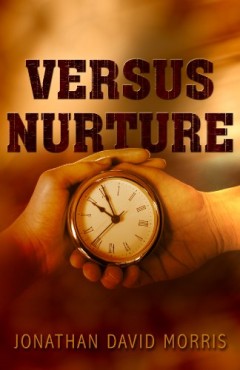
In the interest of full disclosure, here are the books we received in February.
 Arctic Rising Tobias S. Buckell Tor Reviewed |  The Best Sniper Ever Jonathan David Morris | 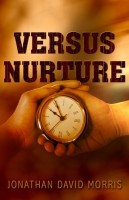 Versus Nurture Jonathan David Morris |
Help Promote Prometheus Unbound by Sharing this Post
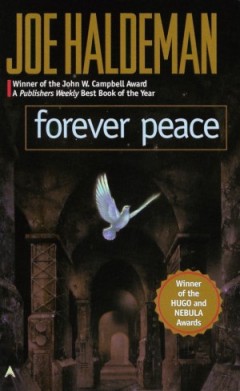
When Joe Haldeman, early in his career, penned his 1970s science fiction classic The Forever War, he claimed his niche in the genre. Whatever happened after that, however well or poorly he performed, however much or little he expanded his legacy, his place at the table was secure. The general consensus is that, despite a career with several successes, he has never managed to equal that early novel. My experience with Mr. Haldeman is too limited to opine on that point, but I can say that in 1997, when he wrote Forever Peace, he definitely fell short but did not miss by a large amount.
Julian Class, a physicist and conscript in the American armed forces, is the protagonist of a story that transpires in the 2040s. The United States, now turned into a centrally planned economy, is at war with guerrillas all over South America and Africa. The principal weapon on the ground is the soldierboy, a deadly robot used for anything from patrolling to reconnaissance to assaults and assassinations. The soldierboys are remote controlled by soldiers like Class who are “jacked in” to the soldierboy through a plug surgically inserted into their brains, Matrix-style (perhaps it would be fairer to say Neuromancer-style).
An entire squad of soldiers controlling the soldierboys attain a oneness with each other, such that everyone’s feelings, thoughts, and experiences are collectively shared. More than simply walking a mile in another’s shoes, this jacking is akin to walking an entire life in another’s shoes, socks, pants, underwear, and t-shirt. At one point Julian Class, who is black, reflects that there is no racism among these soldiers, because it simply is not possible to be racist when you have essentially been another race, or several other races, for days at a time. This idea anticipates a larger revelation made later, which becomes the main point of the book.
Help Promote Prometheus Unbound by Sharing this Post